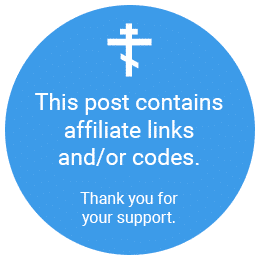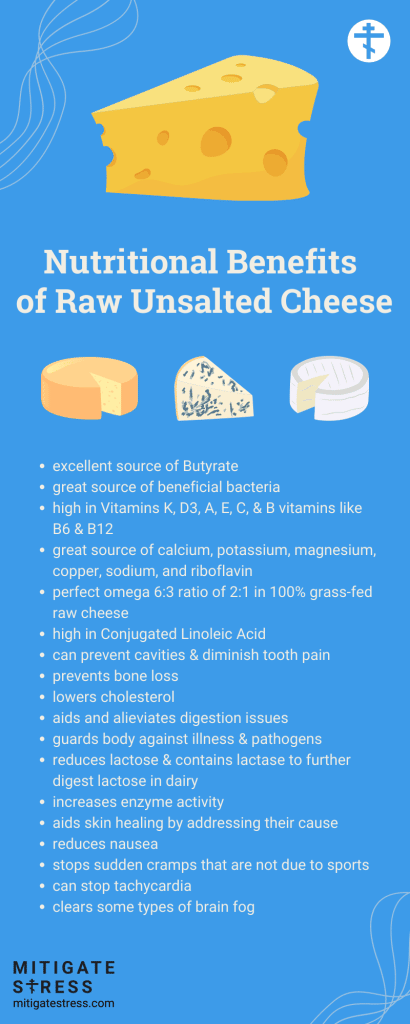Disclaimer: Raw milk and its products are not approved by the Food and Drug Administration, or FDA, due to the risk of serious infectious diseases. However, many advocates can vouch for their health benefits. If you are at risk for infection due to your age, pregnancy, or other conditions, you may want to consult your doctor before eating raw milk cheese.
Raw cheese is a powerhouse of nutrition. It is rich in colloidal minerals and beneficial bacteria.


As a result of its natural probiotic content, raw cheese has many health benefits. It contains beneficial bacteria that promote digestive health and immune function. Probiotics are especially prevalent in goat, sheep, and A2 cow soft cheeses, particularly thermophillus, bifudus, bulgaricus, and acidophilus.
Because of the probiotic properties of raw cheese, it is an excellent source of butyrate, a short-chain fatty acid with many benefits to the body. Butyrate fuels our gut lining and supports colon immune function. It protects the liver, pancreas, and heart and contains anti-cancerous properties. It also prevents certain digestive tract diseases.
It is also significant to note that raw milk and its cheeses contain healthy bacteria that colonize the digestive tract and compete for nutrients with undesirable pathogens. According to Macalester College, St. Paul, Minnesota’s Department of Environmental Studies, this prevents the growth of pathogens and reduces the risk of infection. However, a person with a lowered immune system may become infected by bacteria in raw milk and cheese, so it is always recommended to talk to your healthcare practitioner before introducing this into your diet.
The mineral content of cheese is very high, with forms used for most metabolic functions and tissue-forming processes. In raw cheese, Vitamins K2, D3, and Calcium combine in a synergistic blend of nutrients that protect your bones, brain, and heart. It is also high in Vitamins A and E. Cheese also contains Potassium, Magnesium, Zinc, Selenium, Copper, Naturally Occurring Sodium, B12, and Riboflavin.
There is a perfect omega 6:3 ratio of 2:1 in 100% grass-fed raw cheese and 5x the amount of Conjugated Linoleic Acid (CLA), a cancer-fighting nutrient. Besides increasing metabolism and fat burning, CLA also enhances the body’s natural immunity. Cheese from grain-fed cows is higher in Omega-6 fatty acids, disrupting that perfect omega ratio.
According to researchers, cheese can help prevent cavities. Cheese increases saliva alkalinity in the mouth and stimulates saliva flow, which reduces dental treatment needs. The alkaline nature of saliva buffers plaque acids. Cheese-stimulated saliva also dilutes sugar, increasing sugar clearance. As a result, cheese minimizes the need for dental treatment by neutralizing plaque acid in the mouth and creating a protective film around the teeth.
As Sally Fallon Morell points out in Nourishing Traditions, consuming raw cheese benefits the body by preventing bone loss and lowering cholesterol levels. By providing beneficial bacteria and lactic acid to the digestive system, it also guards the body against illnesses and pathogens. Fermentation increases vitamin B and C content as well. A large portion of lactose in milk is converted into lactic acid, which aids digestion. It also contains lactase, which aids the digestion of lactose in the digestive tract. Digestion is also improved by increasing enzyme activity.
In his vast amount of research, Aajonus Vonderplanitz adds to the list the following benefits:
- Solves many digestion issues
- Heals skin issues by addressing their cause
- Reduces nausea
- Diminishes teeth pain
- Stops sudden cramps that are not due to sports
- Can stop tachycardia
- Clears some types of brain-fog
A 2007 Clinical and Experimental Allergy study shows that raw milk can reduce asthma and hay fever symptoms. According to the study, children who consumed raw milk and milk products had a lower risk of developing asthma or hay fever than those who ate pasteurized milk products. Despite the positive results, scientists concluded that longer-term studies are needed.
The list of benefits for raw cheese is one of the longest for only a single food.
Raw grass-fed cheese has a much better flavor and texture than pasteurized and processed cheeses. Raw cheese is excellent when eaten with raw honey and raw fruit, which helps with digestion further and uses its nutrients to heal and restore metabolic processes.
Resources
- “Health Benefits of Raw Cheese.” Decent Propaganda, 7 Jan. 2019, decentpropaganda.com/health-benefits-of-raw-cheese/.
- Academy of General Dentistry. “Cheese may prevent cavities.” ScienceDaily. ScienceDaily, 5 June 2013. <www.sciencedaily.com/releases/2013/06/130605130118.htm>.
- Unpasteurized Cheese Benefits – Destination Healthy Foods. https://www.destination-healthy-foodsa.com/Unpasteurized-Cheese.html
- Fallon, Sally, et al. Nourishing Traditions: The Cookbook That Challenges Politically Correct Nutrition and the Diet Dictocrats. Washington, Dc, Newtrends Publishing, Inc, 2005.
- “Health Benefits of Raw Milk Cheeses.” LIVESTRONG.COM, www.livestrong.com/article/430444-health-benefits-of-raw-milk-cheeses/.
- ”Raw Milk: Weighing Risks and Benefits.” The Western Producer, 2 May 2014, www.producer.com/news/raw-milk-weighing-risks-and-benefits/. Accessed 26 Sept. 2022.
- “Macalester College Environmental Studies Department.” Web.archive.org, 22 Nov. 2014, web.archive.org/web/20141122204255/www.macalester.edu/academics/environmentalstudies/students/projects/citizenscience2010/foodsafety/index.html. Accessed 20 Sept. 2022.
- “We Want to Live.” Reader.aajonus.org, reader.aajonus.org/we-want-to-live/. Accessed 20 Sept. 2022.
- Healthfully Shop: Raw Unsalted Cheese. https://www.healthfully.shop/product/raw-unsalted-cheese
- Vonderplanitz, Aajonus. The Recipe for Living without Disease. Santa Monica, Carnelian Bay Castle Press, 2002.
- “Benefits of Raw Cheese – Why Raw Cheese Is so Great.” Traditional Cooking School by GNOWFGLINS, 13 Jan. 2010, traditionalcookingschool.com/fermenting-and-culturing/raw-cheese-benefits/.
* This post contains affiliate link(s) or codes. An affiliate link or code means I may earn advertising/referral fees if you make a purchase through my link, without any extra cost to you. It helps to keep our small business afloat. Thanks for your support.